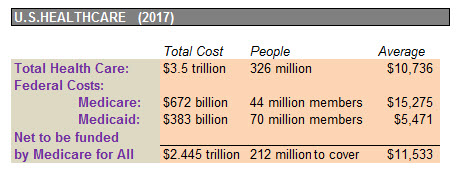Medicare for All? Have They Gone Off Their Meds?
Nov 3 2018If Republicans keep control of Congress, their agenda will be to finally and fully repeal the Affordable Care Act (Obamacare) and then start chipping away at entitlement programs. How do we know? They've said so. Asked about the mounting deficit, Senate Majority Leader Mitch McConnell said, "It's very disturbing and it's driven by the three big entitlement programs…Medicare, Social Security and Medicaid", making no mention of the 2017 tax cuts. "It's a bipartisan problem: unwillingness to address the real drivers of the debt by doing anything to adjust those programs".
The official Republican agenda is to encourage those of Medicare age to leave the program and instead opt for subsidy vouchers to buy insurance in the private 
market. Far left progressives dream of the opposite: government-run Medicare for All. Some congressional candidates are even running in the midterm elections on the promise to fight for a program that is clearly beyond impossible in this politically polarized country.
Conservatives are rattled by the socialist leanings of the young, even to the extent of the White House Council of Economic Advisers issuing a 72-page report that links Democrats to the evils of failed economic policies. What progressives have in mind is something along the lines of the Scandinavian countries, but the report goes straight to Venezuela for 
its example of where social programs such as Medicare for All and free college tuition will lead. A White House press release raised the alarm with its title, "Congressional Democrats Want to Take Money from Hardworking Americans to Fund Failed Socialist Policies".
But in the full realization that it's rather pointless even to discuss it in the America that we now live in, with half of Americans shouting "socialism!" whenever such schemes are mentioned without ever looking further, we thought we'd take a moment to see just what Medicare for All would mean.
going for brokeThat the plan introduced by Vermont's independent senator, Bernie Sanders, grabbed all the attention doesn't help the progressives' cause; his is the most impractical plan by being the most extreme. America is alone among advanced nations in not having universal healthcare but all other countries have hybrid programs that mix government payment for basic healthcare and private insurance for more complete coverage. In contrast, Sanders goes all in. His website announces a plan that...
"will cover the entire continuum of health care, from inpatient to outpatient care; preventive to emergency care; primary care to specialty care, including long-term and palliative care; vision, hearing and oral health care; mental health and substance abuse services; as well as prescription medications, medical equipment, supplies, diagnostics and treatments."
All that with no co-payments, no deductibles. This is no longer Medicare, which has layers of coverage with its parts A, B, C, and D, does not pay 100%, and is completely lacking in catastrophic coverage, which leads seniors to buy "medigap" insurance for what Medicare does not pay. The website text describing Sanders' plan imagines no need for further insurance. It covers everything. Employer-paid insurance would vanish.
cutting out the middlemenThe Affordable Care Act handed the business to insurance companies and did nothing to control drug prices. The single-payer format of Medicare for All would jettison those concessions that won not a single Republican vote in either house of Congress. That would bring automatic cost savings: the insurance companies would be cut adrift along with their hefty management paychecks and corporate profits that waste 13% of our insurance premium payments. Medicare — apart from offshoot programs such as Medicare Advantage — boast only 1.1% administrative costs.
The other big advantage: the weight of Medicare for All sitting at the bargaining table across from pharmaceutical companies would drive drug prices far down. The goal should be to end the stratospheric drug prices big pharma charges in the U.S. to bring into parity the much lower prices successfully negotiated by universal healthcare administrators at bargaining tables elsewhere in the world.
Destined to come to an end under Medicare for All, were it ever enacted, would be the absurd law passed by a Congress grateful for drug companies' contributions to their re-election campaigns that forbids Medicare from negotiating drug prices. The law, in tandem with adding to Medicare the coverage of outpatient prescription drugs, a George W. Bush presidency gift to the drug companies, caused Medicare costs to balloon.
A less mentioned saving would be the elimination of employee health insurance paid by employers. It has been an outrage that for all these years employees have been getting this tax-free addition to their income while workers outside such companies pay for their insurance with dollars left after paying taxes. In 2017 the government forfeited $854 billion by not taxing this employee income. Under Medicare for All, companies would likely be required to increase the 1.45% payroll they now deduct for Medicare, but they will no longer be paying for employee insurance that now verges on $20,000 a year for family plans. That savings will increase their taxable profits, a considerable amount that should count as an offset to Medicare for All's costs.
magical thinkingThese savings are helpful but come nowhere near the funding needed for universal healthcare. BernieSanders.com estimates his Medicare for All plan would cost $1.38 trillion per year. No detail is given for how this figure was arrived at; it's impossibly low considering that U.S. healthcare cost $3.5 trillion in 2017. No mention is made of rising costs in future years. To pay for his estimate, the site lists a number of revenue raising changes that add to the $1.38 trillion:
![]() Employees would pay 2.2% of their paychecks, up from 1.45%.
Employees would pay 2.2% of their paychecks, up from 1.45%. ![]() The 1.45% that employers now pay would rise to 6.2%, matching what employers contribute for Social Security.
The 1.45% that employers now pay would rise to 6.2%, matching what employers contribute for Social Security. ![]() Income tax rates would be scaled upward: the current maximum of 37% that starts at $600,000 would start at $250,000 in the Sanders plan, and step up to a top rate of 52% for households making more than $10 million a year.
Income tax rates would be scaled upward: the current maximum of 37% that starts at $600,000 would start at $250,000 in the Sanders plan, and step up to a top rate of 52% for households making more than $10 million a year. ![]() Capital gains and dividends would be taxed the same as income from work.
Capital gains and dividends would be taxed the same as income from work. ![]() Estate taxes would rise an unspecified amount.
Estate taxes would rise an unspecified amount.
Remarkably, we see from this that Sen. Sanders would have the middle class, those earning less than $250,000, pay almost nothing for healthcare — just 2.2% of payroll, and not even that. The 2.2% would kick in only on income beyond the standard and per-person deductions — $28,800 for a family of four. A household making $50,000 a year would pay only $466. Households now paying close to $20,000 for previously mentioned family plans would have their healthcare almost entirely subsidized by others.
spoiler alertThe critique that grabbed all the attention is by Charles Blahous for The Mercatus Center at George Mason University. A former deputy director of President George W. Bush’s National Economic Council, Blahous came up with $32.6 trillion in funds that the federal government would need across the first 10 years to pay for Medicare for All. Blahous says he arrived at this number by hewing close to Sanders' assumptions, allowing for the cost savings enumerated in his plan, and most notably assuming that all health providers would be paid Medicare rates that run about 40% less than private insurance. In an aside, Blahous calls the 40% assumption unrealistic. Hospitals and doctors are sure to balk, forcing higher payments and further cost that would add hundreds of billions to his $32.6 trillion.
"Even if Congress were to double what it collects in individual and corporate income taxes, there still wouldn’t be enough money added to the federal coffers to finance the costs" of the Sanders plan, Blahous wrote in a Wall Street Journal op-ed.
Those on the left point out that George Mason University tilts right, Mercatus is partly funded by the Koch Brothers (Charles Koch sits on the Mercatus board), so the scary $32.6 trillion over 10 years might be meant to send shivers of fright through the body politic. Why should it, though, if national healthcare spending is already $3.5 trillion for a single year. Blahous' number looks like a bargain.
For that matter, no one's numbers are all that clear. Sanders' total cost makes no sense. When Blahous says "paying for every American’s health-care expenses would increase federal spending by $32.6 trillion [emphasis added]", does he mean beyond what the government now spends or is his cost all inclusive? We are left to make simplistic back of the envelope calculations:

If the $2.445 trillion in the table is increased by 3.3% a year compounded for 10 years, that gets us close to the Blahous $32.6 trillion 10-year estimate, which suggests his cost is additional to what the government now pays.
A careful sorting out of costs and sources of revenue to entirely pay for Medicare for All (entailing major adjustments to Sanders' notion of who pays what) is surely needed, if only for the purpose of knowing whether Medicare for All is at all conceivable.
The dream of universal health care stems from more than the desire to replace with a single, orderly program America's clumsy hodge-podge of private insurance and government programs that leave millions unprotected. It stems from the belief that access by all to healthcare is a fundament of any civilized nation. Illness strikes unfairly at all ages and in the U.S. the costs can ruin families and lives. To cast people adrift, leaving them susceptible to life's vicissitudes, is immoral. We should work with open minds to find a way.
Please subscribe if you haven't, or post a comment below about this article, or
click here to go to our front page.

